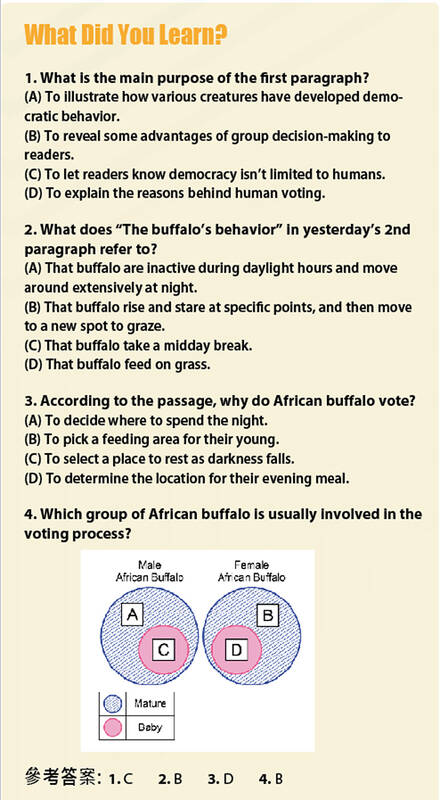Continued from yesterday(延續自昨日)
https://www.taipeitimes.com/News/lang
The African buffalo’s voting system is straightforward. One buffalo initiates the process by getting up, looking intently in a particular direction, and lying back down. If other buffalo agree with this choice, they will mimic this behavior. Conversely, buffalo with a differing preference will face their desired location. Ultimately, the direction favored by the majority dictates where the herd will graze that evening.

Photo: AdobeStock I 照片: AdobeStock
Not all buffalo are involved in the decision-making process, though. It’s primarily the adult females of the herd that participate. The voting system displays a certain level of fairness because the status of each buffalo in the group has no bearing on individual voting power. Every adult female, regardless of their social standing, has an equal voice. By exercising their collective wisdom through voting, African buffalo guarantee a full stomach for all.
非洲水牛的投票系統很簡單。一頭水牛站起來、專注看著特定方向、重新躺下以開始這個程序。如果其他水牛同意這個選擇,牠們就會模仿這個行為。相反地,具有不同偏好的水牛會面對牠們想要的位置。最終,大多數水牛偏好的方向決定了牛群當晚的吃草地點。
不過,並非所有水牛都會參與這個決策過程。主要是牛群中的成年雌性參與。投票系統表現出一定程度的公平性,因為群體中每頭水牛的地位並不影響個體的投票權。每頭成年雌性水牛 ── 無論其社會地位如何 ── 都擁有相等的發言權。非洲水牛透過投票發揮集體智慧,確保全體水牛都能飽餐一頓。

Words in Use
4. periodically adv. 定期地
The manager checks in with the team periodically to track progress.
該經理定期聯繫那個小組以追蹤進度。
5. gaze vi. 凝視,盯著看 & n. 凝視,目光
The husband and wife often sit by the lake and gaze into each other’s eyes.
那對夫妻經常坐在湖畔邊凝望彼此的雙眼。
My mother shifted her gaze from me to my brother, trying to find out who was lying.
我媽把目光從我身上移到我弟,試著要找出誰在說謊。
Practical Phrases
2. have no bearing on... 對……毫無影響
bearing n. 關聯
Minor grammatical errors have no bearing on the overall quality of the essay.
文法小錯誤不影響該論文整體的品質。
聽文章朗讀及講解: https://ivy.pse.is/455bfu
本文出自常春藤解析英語雜誌: www.ivy.com.tw

For many people in Taiwan, childhood memories of rural life include pig pens standing beside family homes. Leftover rice, vegetable scraps and soup from daily meals were poured into buckets and fed to pigs. This practice of feeding pigs with household food waste was once a common way of life, both an economic choice and an expression of agricultural society’s deep respect for conserving resources. From a practical standpoint, pigs are omnivorous animals capable of efficiently digesting food scraps that humans can no longer eat. For rural households, food waste cost almost nothing, yet it could be converted into pork, a

Sea star wasting disease (SSWD) is a strange and serious illness affecting sea stars, or starfish. This disease causes sea stars to develop painful lesions, lose their arms, and eventually turn into a gooey, melted mess. Since it was first observed in 2013, millions of sea stars along the Pacific coast of North America have died from this __1__. Although viruses were once considered a possible cause, researchers now believe that environmental stressors and microorganisms are primarily __2__ for sea star wasting disease. One of the main environmental triggers appears to be warmer ocean water. When the water heats

Tango unfolds in a dimly lit room, where a haunting melody ushers two dancers into a close embrace. Here, music and movement merge into a silent yet passionate conversation, expressing longing, memory and shared purpose. What makes tango truly magical is the deep interaction and spontaneous improvisation between partners. Tango began in the late 19th century in Buenos Aires, Argentina’s bustling capital. Born in the poor working-class neighborhoods and busy port areas, this dance emerged from a melting pot of cultures. European immigrants, African slaves and local residents all contributed to its unique character. From these rich influences, tango

Continued from yesterday(延續自昨日) https://www.taipeitimes.com/News/lang The loss of sea stars significantly impacts the ocean ecosystem. Sea stars are important __6__ that help control populations of mussels and sea urchins. Among them, the sunflower star is one of the largest and fastest sea stars and is adept at preying on sea urchins. Without sea stars, sea urchins can __7__ in numbers and devastate kelp forests. These forests are essential __8__ for many marine animals and also help capture carbon from the atmosphere, which is vital in the fight against climate change. The mystery behind SSWD is still __9__, but it is clear that